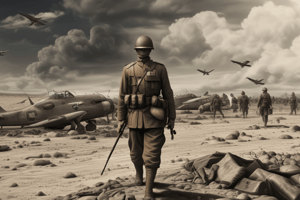Podcast
Questions and Answers
What was a significant consequence of the Treaty of Versailles?
What was a significant consequence of the Treaty of Versailles?
- It led to the establishment of the United States as a dominant world power.
- It imposed heavy reparations on Germany, contributing to its economic instability. (correct)
- It resulted in the annexation of Poland by Germany.
- It led to the immediate disarmament of Germany.
What was the significance of the Battle of Stalingrad?
What was the significance of the Battle of Stalingrad?
- It marked the beginning of Germany's invasion of Poland.
- It led to the surrender of Japanese forces in the Pacific.
- It was a decisive Soviet victory that turned the tide of the war on the Eastern Front. (correct)
- It resulted in the capture of Paris by German forces.
What was the primary reason for the USA's entry into World War II?
What was the primary reason for the USA's entry into World War II?
- The invasion of Poland by Germany.
- The discovery of Nazi concentration camps.
- The surrender of France to Germany.
- The bombing of Pearl Harbor by Japan. (correct)
What was the significance of the Kokoda Track campaign?
What was the significance of the Kokoda Track campaign?
What was the primary purpose of dropping atomic bombs on Hiroshima and Nagasaki?
What was the primary purpose of dropping atomic bombs on Hiroshima and Nagasaki?
How did the Treaty of Versailles contribute to the outbreak of World War II in Europe?
How did the Treaty of Versailles contribute to the outbreak of World War II in Europe?
What was the impact of the Battle of El Alamein on the North African Campaign?
What was the impact of the Battle of El Alamein on the North African Campaign?
What was the significance of the Japanese attack on Pearl Harbor in relation to the USA's entry into World War II?
What was the significance of the Japanese attack on Pearl Harbor in relation to the USA's entry into World War II?
What was the role of Australian forces in the Kokoda Track campaign?
What was the role of Australian forces in the Kokoda Track campaign?
What was the experience of Japanese-held Prisoners of War (POW) during World War II?
What was the experience of Japanese-held Prisoners of War (POW) during World War II?
Flashcards are hidden until you start studying
Study Notes
Causes of World War II in Europe
- Treaty of Versailles (1919) imposed harsh penalties on Germany, contributing to widespread resentment and political instability.
- Failure of the League of Nations to prevent Japanese aggression in Manchuria (1931) and Italian invasion of Ethiopia (1935) undermined its credibility.
- Appeasement policy of Britain and France towards Nazi Germany, exemplified by the Munich Agreement (1938), emboldened Hitler's aggression.
Key Battle in Europe
- Battle of Stalingrad (1942-1943): a major Soviet victory that marked a turning point on the Eastern Front, as Soviet forces encircled and defeated the German Sixth Army.
United States Enters the War
- Pearl Harbour Attack (1941): Japanese surprise attack on the US naval base in Hawaii, drawing the United States into World War II.
- US entry into the war led to a significant shift in the balance of power, as American industrial and military might was mobilized against the Axis powers.
War in the Pacific
- Japan's aggressive expansion: invasion of China (1937), French Indochina (1940), and Southeast Asia (1941-1942) led to conflict with the United States and its allies.
- Japanese military strategy: surprise attacks, island-hopping, and establishing a defensive perimeter to protect its conquests.
Australia's Role in WWII
- Kokoda Track Campaign (1942): Australian troops, alongside Papuan forces, fought a brutal and decisive battle against Japanese forces in Papua New Guinea, slowing their advance.
Japanese Prisoners of War
- Harsh treatment of Allied POWs: forced labour, lack of medical care, and brutal conditions led to high mortality rates.
Atomic Bombs and the War's End
- Atomic bombings of Hiroshima (August 6, 1945) and Nagasaki (August 9, 1945): the devastating attacks led to Japan's unconditional surrender, ending World War II.
Causes of World War II in Europe
- Treaty of Versailles (1919) imposed harsh penalties on Germany, contributing to widespread resentment and political instability.
- Failure of the League of Nations to prevent Japanese aggression in Manchuria (1931) and Italian invasion of Ethiopia (1935) undermined its credibility.
- Appeasement policy of Britain and France towards Nazi Germany, exemplified by the Munich Agreement (1938), emboldened Hitler's aggression.
Key Battle in Europe
- Battle of Stalingrad (1942-1943): a major Soviet victory that marked a turning point on the Eastern Front, as Soviet forces encircled and defeated the German Sixth Army.
United States Enters the War
- Pearl Harbour Attack (1941): Japanese surprise attack on the US naval base in Hawaii, drawing the United States into World War II.
- US entry into the war led to a significant shift in the balance of power, as American industrial and military might was mobilized against the Axis powers.
War in the Pacific
- Japan's aggressive expansion: invasion of China (1937), French Indochina (1940), and Southeast Asia (1941-1942) led to conflict with the United States and its allies.
- Japanese military strategy: surprise attacks, island-hopping, and establishing a defensive perimeter to protect its conquests.
Australia's Role in WWII
- Kokoda Track Campaign (1942): Australian troops, alongside Papuan forces, fought a brutal and decisive battle against Japanese forces in Papua New Guinea, slowing their advance.
Japanese Prisoners of War
- Harsh treatment of Allied POWs: forced labour, lack of medical care, and brutal conditions led to high mortality rates.
Atomic Bombs and the War's End
- Atomic bombings of Hiroshima (August 6, 1945) and Nagasaki (August 9, 1945): the devastating attacks led to Japan's unconditional surrender, ending World War II.
Studying That Suits You
Use AI to generate personalized quizzes and flashcards to suit your learning preferences.




